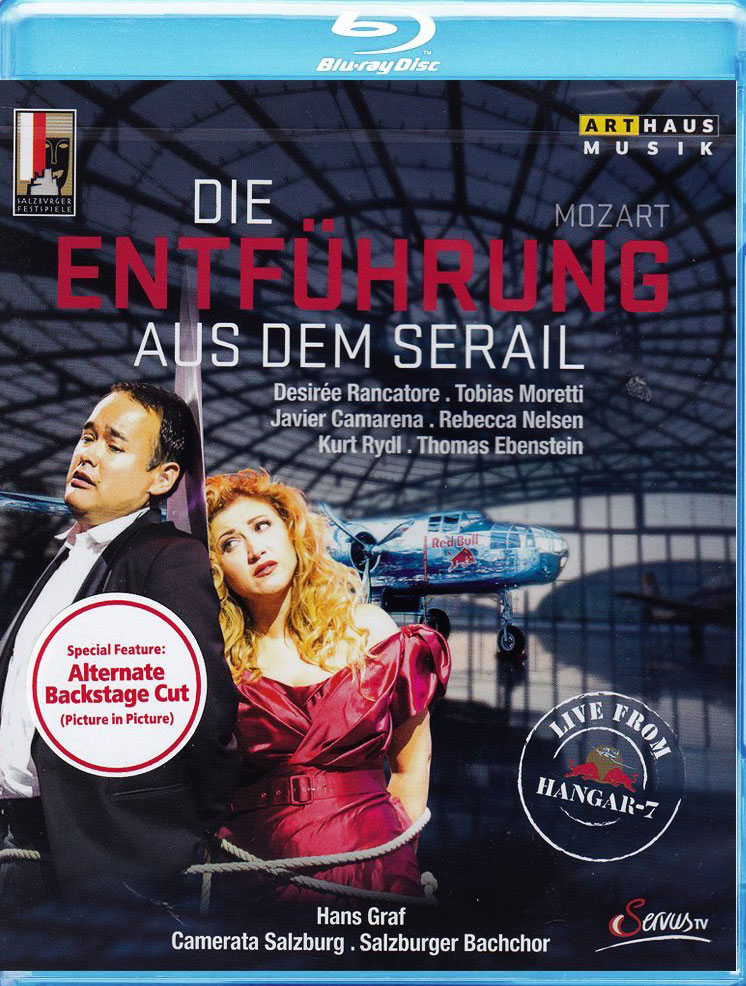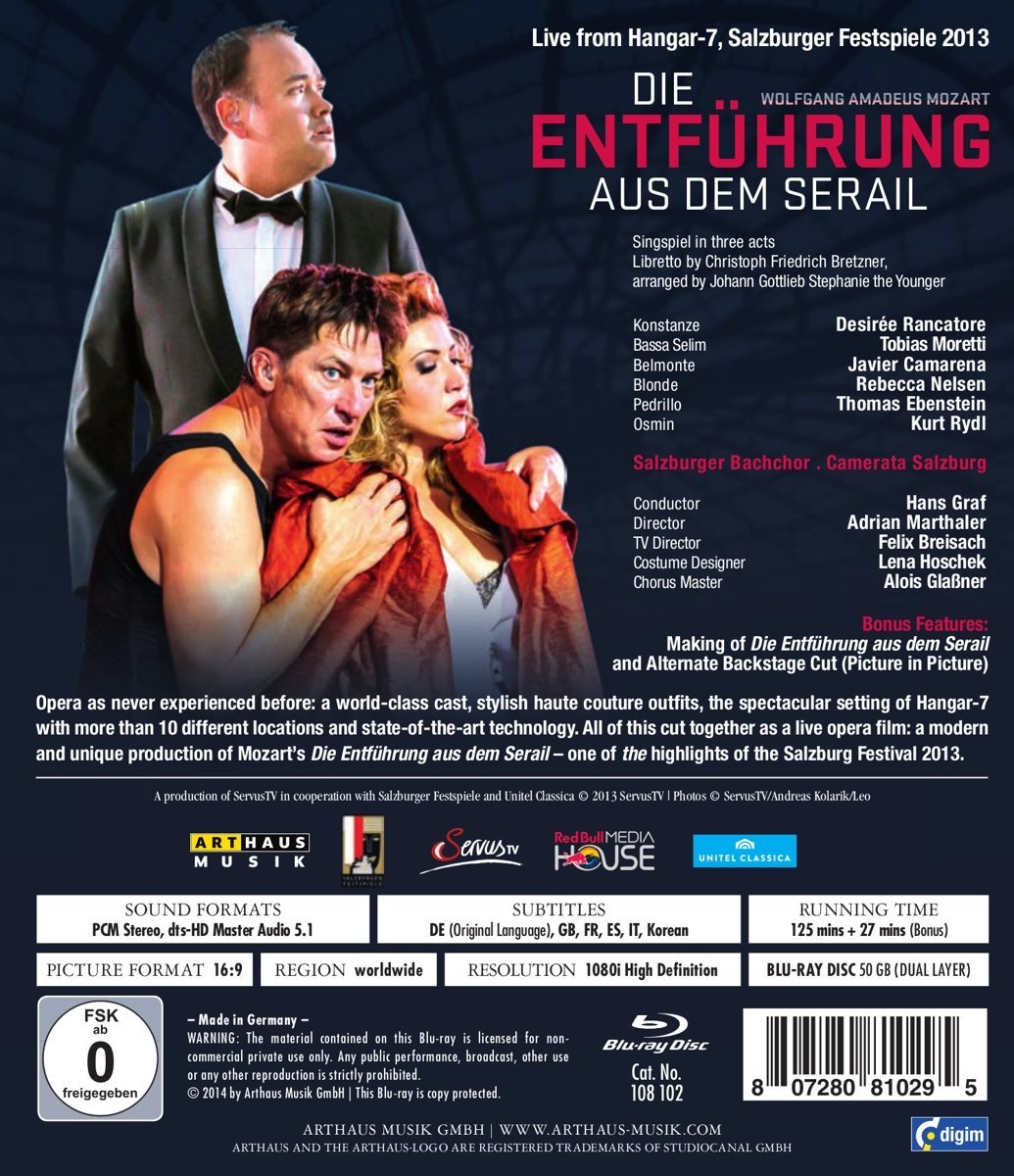Mozart: Live from Hangar-7, Salzburger Festspiele 2013 [Blu-ray]
Conductor: Hans Graf | Composer: Wolfgang Amadeus Mozart | Director: Adrian Marthaler | Performers: Desirée Rancatore, Javier Camarena, Kurt Rydl | Orchestra/Ensemble: Camerata Salzburg, Salzburg Bach Choir | Label: Arthaus Musik | Blu-ray | Picture format: 1080i High Definition | Sound format: PCM Stereo / DTS-HD Master Audio 5.1 | File hosts: Uploaded.net, share-online.biz | 5% recovery + 3 .rev files | Run time: 125 mins (opera) + 27 mins (bonus) | 38.5 GB Language: German | Subtitles: German, English, French, Spanish, Italian, Korean | Hangar-7, Salzburger Festspiele, 2013
Conductor: Hans Graf | Composer: Wolfgang Amadeus Mozart | Director: Adrian Marthaler | Performers: Desirée Rancatore, Javier Camarena, Kurt Rydl | Orchestra/Ensemble: Camerata Salzburg, Salzburg Bach Choir | Label: Arthaus Musik | Blu-ray | Picture format: 1080i High Definition | Sound format: PCM Stereo / DTS-HD Master Audio 5.1 | File hosts: Uploaded.net, share-online.biz | 5% recovery + 3 .rev files | Run time: 125 mins (opera) + 27 mins (bonus) | 38.5 GB Language: German | Subtitles: German, English, French, Spanish, Italian, Korean | Hangar-7, Salzburger Festspiele, 2013

Opera as never experienced before: a world-class cast, stylish haute couture outfits, the spectacular setting of Hangar-7 with more than 10 different locations and state-of-the-art technology. All of this cut together as a live opera film: a modern and unique production of Mozart’s “Die Entführung aus dem Serail” – one of the highlights of the Salzburg Festival 2013. In Adrian Marthaler’s production, the whole Hangar-7 at Salzburg Airport becomes the backdrop for an extraordinary opera performance. The distinguished Camerata Salzburg is conducted by Hans Graf, one of the best Mozart connoisseurs. The star soloists including Desirée Rancatore (Konstanze), Javier Camarena (Belmonte), Kurt Rydl (Osmin) as well as famed Austrian actor Tobias Moretti as Bassa Selim guarantee a special treat. Even audiences that are not yet opera aficionados are set to be enthused by this novel approach.
Watch a Trailer (sample is a lower resolution than actual DVD or Blu-ray):
REVIEW
John Yohalem, operatoday.com
We see the characters first in two boxes at an opera house. The five singers share a box and stare at the stage. But Konstanze’s eye is caught by a man in a box opposite: Bassa Selim (actor Tobias Moretti), who stares steadily at her and broods in voiceover at having lost her, his inspiration.
Bassa Selim is a Valentino-like dress designer (“BASSA” reads the license plate on his Jeep, and his logo, “BS,” resembles the signature of a sultan). Konstanze is a supermodel (übermodel?) lured from her lover, Belmonte. Blondchen is one of the many seamstresses we see at their machines, working on the new collection. Osmin is a power-lifting major d’omo. Pedrillo works in IT. The entire production was staged for telecast in Hangar-7 of the Salzburg Airport, otherwise a museum for classic Formula 1 race cars and fancy airplanes. Pedrillo sings “Frisch zum Kampfe” in the cockpit of a fighter. “Vivat Bacchus” is sung at a cocktail bar. Ramps and labyrinths crisscross the space, and singers perform their arias while parading up, down and around, always on camera. There is a lighted runway (and four models in statuesque gowns by designer Lena Hoschek to slink along it). And the entire performance appears to be taking place in real time, for television airing, with an audience of Festival-goers following the singers around the huge space.
Somehow the airy sense of this joyful fable never evaporates under what could have seemed a heavy-handed treatment. This is very much to the credit of stage director Adrian Marthaler and video director Felix Breisach: They do not permit the high concept to crush the quicksilver charm of this ever delectable score, the forerunner and pre-echo not merely of Zauberflöte but also of Fidelio and Der Freischütz.
The success is also very much to the credit of the singers. Not only are the cameras “in their faces,” backing down ramps as they sing or intruding on them in dressing rooms, the audience is not sitting in the theater but pursues them all about the set. Too, the orchestra is not present—they’re over at Hangar-8, audible to the singers by visible earphone-microphones of the sort nowadays familiar on Broadway. Presumably, the conductor is visible on screens above the cameras, but following such a trick can’t be a usual part of the opera singer’s skill set—or not until lately. It’s probably very much a skill young singers are obliged to acquire. Too, very rarely do a singer’s eyes look inappropriately away—following the conductor—as happens so often in filmed opera. And all of them look good and act well, though Kurt Rydl, an experienced Osmin, looks neither young enough nor muscular enough for the part as here conceived.
Everybody sings well if not precisely at top star level. Désirée Rancatore (the 27-minute “bonus” film on the making of this project makes clear) was a last-minute replacement when Diana Damrau became pregnant, but she leaped at it and she carries it off, her sorrows and regrets, resisting a genuine attraction to Selim to remain true to Belmonte, visible in her expressions. One has heard more precise “Martern aller Arten”s, but this was a well-shaped performance, and her “Traurigkeit” is melting and moving.
Javier Camarena displays subtler acting chops here than in his self-consciously bumptious appearances at the Met last spring as Bellini’s Elvino and Rossini’s Don Ramiro. Too, the entire quality of the voice, which seemed Latin, almost voluptuous in Bellini and Rossini, is entirely different here, a dignified, well-proportioned German sound. Thomas Ebenstein’s Pedrillo is all grinning Viennese operetta, good-natured and sexy, though his suave tenor is of rather higher quality than operettas usually get these days. The find among the lovers, however, is Rebecca Nelsen, an American unknown to me, whose Blondchen is brilliant when she needs to scatter high spirits to the stratosphere without forfeiting a womanly beauty displayed throughout her range. A pretty woman, a fine actress, and a singer I hope to encounter in the future. The veteran Kurt Rydl, forced to sing his initial ballad while pulling weights, is grayer and less able at his assignment, Osmin—less adept at the fioritura than he was a generation ago but fiery in his torture manifestoes. Tobias Moretti acts proud but conflicted, a man who chooses not to exercise the violence his frustrated passions suggest: The controlled hero Mozart admired. Admirable as he was, one felt, as always, a regret at his having no music to display himself. Couldn’t we borrow one of the pasha’s arias from Zaide for Selim?
Hans Graf and the Camerata Salzburg revel in this wonderful score, and the flow of melodious delight is perfect for any evening’s entertainment.
CAST
Konstanze – Desirée Rancatore
Bassa Selim – Tobias Moretti
Belmonte – Javier Camarena
Blonde – Rebecca Nelsen
Pedrillo – Thomas Ebenstein
Osmin – Kurt Rydl
Salzburg Bach Choir
(chorus master: Alois Glaßner)
Camerata Salzburg
Hans Graf, conductor
Adrian Marthaler, stage director
Lena Hoschek, costume designer
Works on This Recording
1.
Die Entführung aus dem Serail, K 384 by Wolfgang Amadeus Mozart
Performer: Kurt Rydl (Bass), Rebecca Nelsen (Soprano), Thomas Ebenstein (Tenor),
Tobias Moretti (Spoken Vocals), Désirée Rancatore (Soprano), Javier Camarena (Tenor)
Conductor: Hans Graf
Orchestra/Ensemble: Camerata Salzburg, Salzburg Bach Choir
Period: Classical
Written: 1782; Vienna, Austria
 No Password
No Password


0 comments:
Post a Comment